Audi Q7 VS Ford Transit Transporter
Audi Q7
The Audi Q7 combines luxurious comfort with impressive versatility, making it a standout choice in the SUV market. Its sophisticated design and meticulous attention to detail create an elegant yet robust presence on the road. With advanced technology and a focus on safety, the Q7 ensures a premium driving experience for both the driver and passengers.
more informationFord Transit Transporter
The Ford Transit Transporter has long been a staple in the commercial vehicle sector, renowned for its reliability and versatility. It offers a comfortable cabin with a modern design that enhances the driving experience, making long journeys more enjoyable. With a focus on practicality, the Transit provides ample cargo space, meeting the demands of businesses and individual users alike.
more information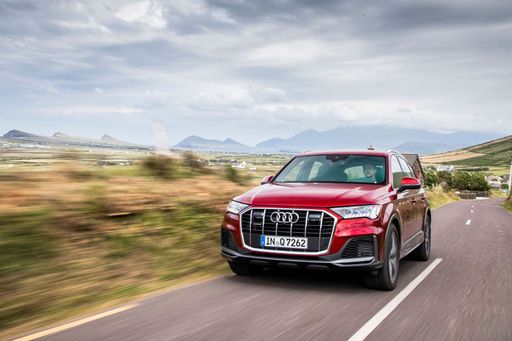 @ audi-mediacenter.com
@ audi-mediacenter.com
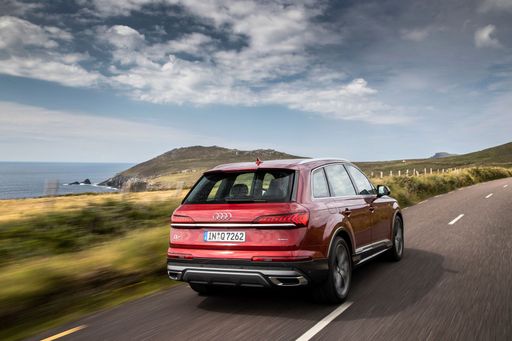 @ audi-mediacenter.com
@ audi-mediacenter.com
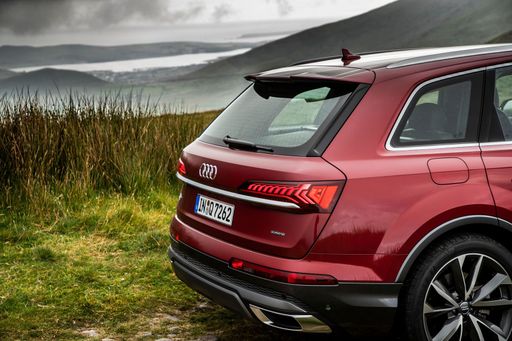 @ audi-mediacenter.com
@ audi-mediacenter.com
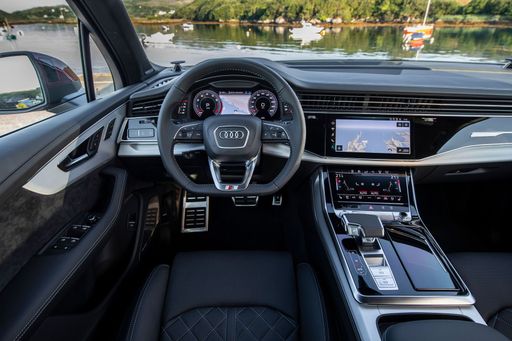 @ audi-mediacenter.com
@ audi-mediacenter.com
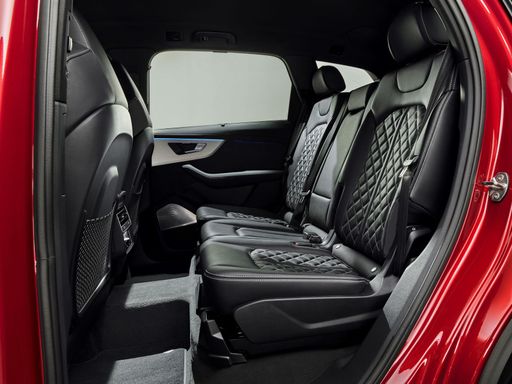 @ audi-mediacenter.com
@ audi-mediacenter.com
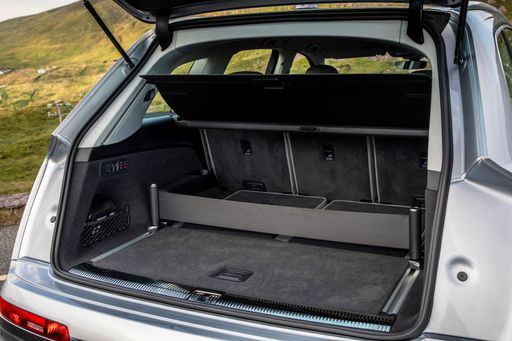 @ audi-mediacenter.com
@ audi-mediacenter.com
Costs and Consumption |
|
|---|---|
|
Price
about 68000 - 97300
£
|
Price
about 39900 - 69100
£
|
|
Consumption L/100km
1.2 - 12
L
|
Consumption L/100km
7.9 - 10.3
L
|
|
Consumption kWh/100km
-
|
Consumption kWh/100km
21.3 - 32
kWh
|
|
Electric Range
83 - 84
km
|
Electric Range
247 - 317
km
|
|
Battery Capacity
22
kWh
|
Battery Capacity
68
kWh
|
|
co2
28 - 272
g/km
|
co2
206, 208, 225, 244, 218, 238, 0, 268, 270
g/km
|
|
Fuel tank capacity
75 - 85
L
|
Fuel tank capacity
70
L
|
Dimensions and Body |
|
|
Body Type
SUV
|
Body Type
Cargo Van
|
|
Seats
5 - 7
|
Seats
3 - 6
|
|
Doors
5
|
Doors
4
|
|
Curb weight
2055 - 2460
kg
|
Curb weight
2074 - 2765
kg
|
|
Trunk capacity
563 - 887
L
|
Trunk capacity
-
|
|
Length
5072
mm
|
Length
5531 - 6704
mm
|
|
Width
1970
mm
|
Width
2059
mm
|
|
Height
1703 - 1735
mm
|
Height
2530 - 2778
mm
|
|
Payload
640 - 885
kg
|
Payload
735 - 2607
kg
|
Engine and Performance |
|
|
Engine Type
Diesel MHEV, Plugin Hybrid, Petrol MHEV, Petrol
|
Engine Type
Diesel, Electric
|
|
Transmission
Automatic
|
Transmission
Manuel, Automatic
|
|
Transmission Detail
Automatic Gearbox
|
Transmission Detail
Manual Gearbox, Automatic Gearbox, Reduction Gearbox
|
|
Drive Type
All-Wheel Drive
|
Drive Type
Front-Wheel Drive, Rear-Wheel Drive, All-Wheel Drive
|
|
Power HP
231 - 507
HP
|
Power HP
105 - 269
HP
|
|
Acceleration 0-100km/h
4.1 - 7.1
s
|
Acceleration 0-100km/h
-
|
|
Max Speed
226 - 250
km/h
|
Max Speed
120
km/h
|
|
Torque
500 - 770
Nm
|
Torque
310 - 430
Nm
|
|
Number of Cylinders
6 - 8
|
Number of Cylinders
4
|
|
Power kW
170 - 373
kW
|
Power kW
77 - 198
kW
|
|
Engine capacity
2967 - 3996
cm3
|
Engine capacity
1995
cm3
|
|
Top speed
226 - 250
km/h
|
Top speed
120
km/h
|
General |
|
|
Model Year
2024
|
Model Year
2019 - 2024
|
|
CO2 Efficiency Class
G, B
|
CO2 Efficiency Class
G, A
|
|
Brand
Audi
|
Brand
Ford
|
Audi Q7
Audi Q7: A Benchmark in Automotive Excellence
The Audi Q7 continues to hold its ground as a versatile and luxurious SUV, offering a rich blend of cutting-edge technology, impressive performance, and comfort. With its recent facelift, the Q7 introduces innovative elements that cater to modern-day driving demands. Explore the technical details and unique attributes that make the Audi Q7 a class leader.
Engine Options and Performance
The Audi Q7 is available with a range of engine options designed to suit various needs and preferences. These include Diesel Mild-Hybrid, Plug-in Hybrid, and Petrol Mild-Hybrid configurations. The power output for these engines ranges from 231 to an exhilarating 507 PS, catering to both efficiency seekers and performance enthusiasts. The Audi Q7 can accelerate from 0 to 100 km/h in as little as 4.1 seconds, showcasing its athletic performance.
Innovative Technology Integration
The Audi Q7 integrates the latest technological advancements to enhance the driving experience. The intuitive Audi Virtual Cockpit and a comprehensive infotainment system ensure that the driver remains informed and entertained. The vehicle’s mild-hybrid systems significantly improve fuel efficiency and reduce emissions, highlighting Audi’s commitment to sustainability without sacrificing performance.
Advanced Safety and Driver Assistance
The Q7 is equipped with state-of-the-art safety features and driver assistance systems to ensure peace of mind on the road. Audi Pre Sense, adaptive cruise control, lane-keeping assist, and a 360-degree camera system work seamlessly together to help prevent accidents and enhance the driving experience.
Design and Interior Comfort
With its bold, sophisticated design, the Audi Q7 is both robust and stylish. The SUV offers configurations for five to seven seats, making it adaptable for families and groups. Meticulously crafted materials, adjustable seating, and advanced climate control systems provide a comfortable environment, even on long journeys.
Environmental Efficiency
The Audi Q7’s environmentally conscious engineering includes models with CO2 emissions as low as 28 g/km. For those opting for the Plug-in Hybrid variant, an impressive electric range of up to 84 km ensures emission-free mobility for daily commutes, reinforcing Audi's commitment to a sustainable future.
Conclusion
The Audi Q7 embodies a sophisticated blend of power, technology, and luxury, making it a standout in its class. Whether you’re looking for a spacious family vehicle, a tech-savvy companion, or a robust performance SUV, the Q7 delivers at every front, proving why it remains a popular choice for discerning drivers.
Ford Transit Transporter
Discovering the Ford Transit Transporter: A Blend of Tradition and Innovation
The Ford Transit Transporter has long been a staple in the commercial vehicle market, known for its reliability and versatility. As Ford continues its innovative journey, the Transit Transporter integrates modern technology and eco-friendly advancements, making it more appealing than ever. Here, we explore some of its key technical details and innovations.
Under the Bonnet: Engine Variants and Efficiency
The Ford Transit Transporter offers a variety of engine options to cater to diverse commercial needs. Among these, the 2.0 EcoBlue Diesel engine provides a robust selection of power outputs, ranging from 105 to 165 PS. Not just limited to traditional fuel, Ford also introduces the E-Transit line with electric motors generating up to 269 PS. This transition to electric is an essential step towards sustainability, achieving an impressive range of 247 to 317 km on a full charge.
Fuel Economy and Environmental Impact
When it comes to fuel efficiency, the Transit Transporter presents a competitive edge with diesel variants consuming between 7.9 to 10.3 L/100km. On the electric side, consumption levels are measured at 21.3 to 32 kWh/100km. Furthermore, the Transit’s CO2 emissions range from zero for electric models to 270 g/km for select diesel engines, placing the vehicle in varying CO2 efficiency classes from G to A.
Performance and Driving Dynamics
Designed for optimal performance, the vehicle’s torque output ranges from 310 to 430 Nm, facilitating smooth and powerful driving experiences across various terrains. The Transit Transporter boasts a maximum speed of 120 km/h, ensuring timely commutes and deliveries, crucial for business efficacy.
The Versatility of Drivetrain Options
The Ford Transit Transporter provides an array of drivetrain configurations, including front-wheel, rear-wheel and all-wheel drive. This adaptability enables the vehicle to tackle different driving conditions with ease, offering stability and resilience no matter the challenge.
Technology and Innovation on Board
Ford’s commitment to innovation is evident within the Transit Transporter’s interior. Intuitive features such as advanced driver-assistance systems, smart connectivity tools, and ergonomic seating arrangements ensure that both driver and passengers enjoy a seamless and comfortable journey, ideal for long rides or daily routines.
Crafted for Practicality and Comfort
With length variations extending from 5531 mm to 6704 mm, and height options from 2530 mm to 2778 mm, the Ford Transit Transporter offers expansive cargo space and flexible seating arrangements. Depending on the variant, seating options range from 3 to 6 seats, catering to diverse passenger and cargo needs.
A Future-Ready, Cost-Effective Choice
Price tags for the Ford Transit Transporter range from €46,589 to €80,611, accommodating different budget requirements. With monthly operation costs calculated between €1430 and €1991, the Transit remains a financially viable option for businesses seeking reliability and efficiency.
Conclusion: An Unyielding Commitment to Excellence
The Ford Transit Transporter stands as a testament to Ford’s dedication to marrying tradition with progress. With its diverse range of powertrains, technological integrations, and practical design, it continues to lead the commercial vehicle segment, ready to meet the challenges of modern mobility and sustainability.
